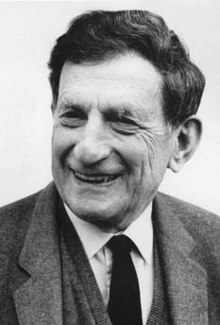
Back ديفيد بوم Arabic ديفيد بوم ARZ دیوید بوهم AZB ডেভিড বোম Bengali/Bangla David Bohm Czech David Bohm Welsh David Bohm Danish David Bohm German David Bohm Spanish David Bohm Estonian
David Bohm | |
|---|---|
 | |
| Born | 20 December 1917 |
| Died | 27 October 1992 (aged 74) London, England, UK |
| Nationality | American-Brazilian-British |
| Citizenship |
|
| Alma mater | |
| Known for |
|
| Awards | |
| Scientific career | |
| Fields | Theoretical physics |
| Institutions | |
| Doctoral advisor | Robert Oppenheimer |
| Doctoral students | |
David Joseph Bohm FRS[1] (/boʊm/; 20 December 1917 – 27 October 1992) was an American scientist who has been described as one of the most significant theoretical physicists of the 20th century[2] and who contributed unorthodox ideas to quantum theory, neuropsychology and the philosophy of mind. Among his many contributions to physics is his causal and deterministic interpretation of quantum theory known as De Broglie–Bohm theory.
Bohm advanced the view that quantum physics meant that the old Cartesian model of reality—that there are two kinds of substance, the mental and the physical, that somehow interact—was too limited. To complement it, he developed a mathematical and physical theory of "implicate" and "explicate" order.[3] He also believed that the brain, at the cellular level, works according to the mathematics of some quantum effects, and postulated that thought is distributed and non-localised just as quantum entities are.[4][failed verification] Bohm's main concern was with understanding the nature of reality in general and of consciousness in particular as a coherent whole, which according to Bohm is never static or complete.[5]
Bohm warned of the dangers of rampant reason and technology, advocating instead the need for genuine supportive dialogue, which he claimed could bridge and unify conflicting and troublesome divisions in the social world. In this, his epistemology mirrored his ontology.[6]
Born in the United States, Bohm obtained his Ph.D. under J. Robert Oppenheimer at the University of California, Berkeley. Due to his Communist affiliations, he was the subject of a federal government investigation in 1949, prompting him to leave the U.S. He pursued his career in several countries, becoming first a Brazilian and then a British citizen. He publicly distanced himself from Marxism during the controversy of the Hungarian Uprising in 1956.[7][8]
- ^ B. J. Hiley (1997). "David Joseph Bohm. 20 December 1917 – 27 October 1992: Elected F.R.S. 1990". Biographical Memoirs of Fellows of the Royal Society. 43: 107–131. doi:10.1098/rsbm.1997.0007. S2CID 70366771.
- ^ David Peat Who's Afraid of Schrödinger's Cat? The New Science Revealed: Quantum Theory, Relativity, Chaos and the New Cosmology 1997, pp. 316–317
- ^ David Bohm: Wholeness and the Implicate Order, Routledge, 1980 (ISBN 0-203-99515-5).
- ^ Cite error: The named reference
holowas invoked but never defined (see the help page). - ^ Wholeness and the Implicate Order, Bohm – 4 July 2002
- ^ David Bohm: On Dialogue (2004) Routledge
- ^ Becker, Adam (2018). What is Real?: The Unfinished Quest for the Meaning of Quantum Physics. Basic Books. p. 115. ISBN 978-0-465-09605-3.
- ^ Freire Junior, Olival (2019). David Bohm:A Life Dedicated to Understanding the Quantum World. Springer. p. 37. ISBN 978-3-030-22714-2.